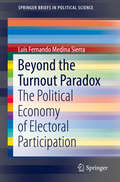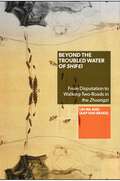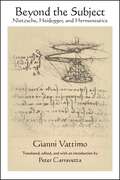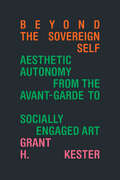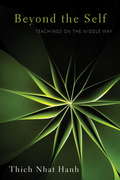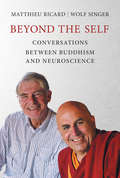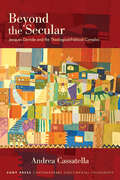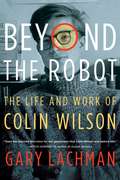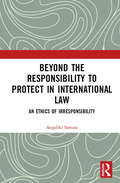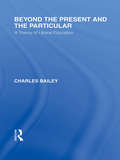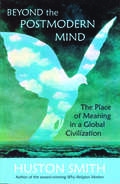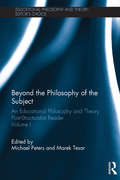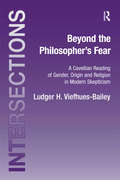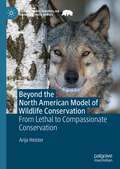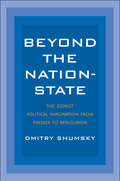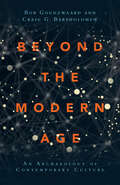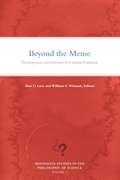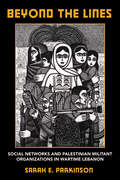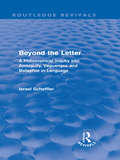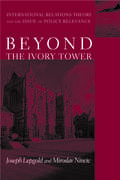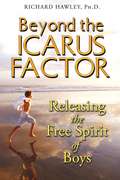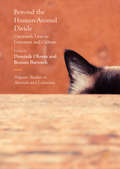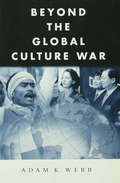- Table View
- List View
Beyond the Turnout Paradox
by Luis Fernando Medina SierraThis Brief uses game-theoretic analysis to debunk the turnout paradox and offers an alternative economic model to elucidate the patterns behind the socioeconomic bias in turnout. The author argues that the turnout paradox—the idea that rational, strategic actors would not vote in an election—is an overstated problem, and that, contrary to widespread belief, game-theoretic models of elections with highly realistic parameters are compatible with high turnout. The author applies the method of stability sets to the study of voting games so as to characterize the behavior of electoral turnout in response to the game’s structural parameters. To illustrate the power and potential of this framework, the author then develops a politico-economic model that generates testable theories about the way in which the modern welfare state and redistribution of wealth can shape the patterns of biased turnout that exist in most democracies. By turning a classic problem of rational choice into a source of new methods of analysis this Brief allows game theory to intervene in relevant conversations about the political economy of electoral participation, creating an opportunity for formal methods to make a welcome contribution to the discipline. As such, this Brief will be of use to scholars and student of political science, economics, political economy, and public policy, especially those who work in the tradition of formal methods.
Beyond the Troubled Water of Shifei: From Disputation to Walking-Two-Roads in the Zhuangzi (SUNY series in Chinese Philosophy and Culture)
by Lin Ma Jaap van BrakelIn recent decades, a growing concern in studies in Chinese intellectual history is that Chinese classics have been forced into systems of classification prevalent in Western philosophy and thus imperceptibly transformed into examples that echo Western philosophy. Lin Ma and Jaap van Brakel offer a methodology to counter this approach, and illustrate their method by carrying out a transcultural inquiry into the complexities involved in understanding shi and fei and their cognate phrases in the Warring States texts, the Zhuangzi in particular. The authors discuss important features of Zhuangzi's stance with regard to language-meaning, knowledge-doubt, questioning, equalizing, and his well-known deconstruction of the discourse in ancient China on shifei. Ma and van Brakel suggest that shi and fei apply to both descriptive and prescriptive languages and do not presuppose any fact/value dichotomy, and thus cannot be translated as either true/false or right/wrong. Instead, shi and fei can be grasped in terms of a pre-philosophical notion of fitting. Ma and van Brakel also highlight Zhuangzi's idea of "walking-two-roads" as the most significant component of his stance. In addition, they argue that all of Zhuangzi's positive recommendations are presented in a language whose meaning is not fixed and that every stance he is committed to remains subject to fundamental questioning as a way of life.
Beyond the Subject: Nietzsche, Heidegger, and Hermeneutics (SUNY series in Contemporary Italian Philosophy)
by Gianni VattimoIn Beyond the Subject Gianni Vattimo offers a reading of Nietzsche and Heidegger that shows how the premises to overcome the metaphysical Subject were already embedded in their thought. Vattimo makes a case for a Nietzsche who is not concerned with the structure and glorification of the Overman, but rather with its opposite, by showing how it is the single individual who must see and accept his/her potential and then excel and develop an inner strength and ethic. He reads Heidegger as concerned with the inevitable distortion present in every interpretation, which, when confronted and accepted, humbles us to deal with a less overarching telos or Grund, and makes us more attuned to contingency and interpersonal communication—what Vattimo calls a "weakened" notion of being. These original readings of Nietzsche and Heidegger pave the way for Vattimo's concept of weak thought and open up to a future social ethic that is less agonistic and more community oriented. This edition includes two supplementary essays from 1986 and 1988 that expand on the same themes, providing a deeper look at an important decade in the development of Vattimo's thought.
Beyond the Sovereign Self: Aesthetic Autonomy from the Avant-Garde to Socially Engaged Art
by Grant H. KesterIn Beyond the Sovereign Self Grant H. Kester continues the critique of aesthetic autonomy begun in The Sovereign Self, showing how socially engaged art provides an alternative aesthetic with greater possibilities for critical practice. Instead of grounding art in its distance from the social, Kester shows how socially engaged art, developed in conjunction with forms of social or political resistance, encourages the creative capacity required for collective political transformation. Among others, Kester analyzes the work of conceptual artist Adrian Piper, experimental practices associated with the escrache tradition in Argentina, and indigenous Canadian artists such as Nadia Myre and Michèle Taïna Audette, showing how socially engaged art catalyzes forms of resistance that operate beyond the institutional art world. From the Americas and Europe to Iran and South Africa, Kester presents a historical genealogy of recent engaged art practices rooted in a deep history of cultural production, beginning with nineteenth-century political struggles and continuing into contemporary anticolonial resistance and other social movements.
Beyond the Self: Teachings on the Middle Way
by Thich Nhat HanhOne of the Buddha's most central ideas is the importance of transcending "either/or" thinking to avoid the trap of extremist views. In Beyond the Self Thich Nhat Hanh suggests that we can find tranquility by embracing all aspects of life, instead of focusing on what we like and dislike. The book contains Nhat Hanh's original translation of the Sutra on the Middle Way, as well as his commentary on how we can use this teaching to better understand how to navigate our difficulties and find peace of mind. By changing how we see the world, Beyond the Self helps us transform ourselves.
Beyond the Self: Conversations between Buddhism and Neuroscience (The\mit Press Ser.)
by Matthieu Ricard Wolf SingerConverging and diverging views on the mind, the self, consciousness, the unconscious, free will, perception, meditation, and other topics.Buddhism shares with science the task of examining the mind empirically; it has pursued, for two millennia, direct investigation of the mind through penetrating introspection. Neuroscience, on the other hand, relies on third-person knowledge in the form of scientific observation. In this book, Matthieu Ricard, a Buddhist monk trained as a molecular biologist, and Wolf Singer, a distinguished neuroscientist—close friends, continuing an ongoing dialogue—offer their perspectives on the mind, the self, consciousness, the unconscious, free will, epistemology, meditation, and neuroplasticity. Ricard and Singer's wide-ranging conversation stages an enlightening and engaging encounter between Buddhism's wealth of experiential findings and neuroscience's abundance of experimental results. They discuss, among many other things, the difference between rumination and meditation (rumination is the scourge of meditation, but psychotherapy depends on it); the distinction between pure awareness and its contents; the Buddhist idea (or lack of one) of the unconscious and neuroscience's precise criteria for conscious and unconscious processes; and the commonalities between cognitive behavioral therapy and meditation. Their views diverge (Ricard asserts that the third-person approach will never encounter consciousness as a primary experience) and converge (Singer points out that the neuroscientific understanding of perception as reconstruction is very like the Buddhist all-discriminating wisdom) but both keep their vision trained on understanding fundamental aspects of human life.
Beyond the Secular: Jacques Derrida and the Theological-Political Complex (SUNY series in Contemporary Continental Philosophy)
by Andrea CassatellaThrough an in-depth, critical analysis of Jacques Derrida's later writings, Beyond the Secular examines the contemporary nexus between religion and politics. Reconnecting these writings to his early works, Andrea Cassatella explores distinctive topics that are thematically linked by the theological-political problematic and theoretically informed by Derrida's relational approach to language, time, religion and politics. The result is a critical investigation into under-examined assumptions of modern secular discourse that questions its binary logics and illuminates such discourse's exclusionary character by tracing its roots in racialized understandings about language, epistemology, politics and religion that travel worldwide through global processes of assimilatory translation. By exposing the discriminatory hierarchies that the Western-Christian, sexualized, and racialized presuppositions of secular discourse keep producing and maintaining, Cassatella ultimately sheds light on the deep entanglements of secularism with the legacy of race and colonialism.
Beyond the Robot: The Life and Work of Colin Wilson
by Gary LachmanHistorian Gary Lachman delivers a fascinating, rollicking biography of literary and cultural rebel Colin Wilson, one of the most adventurous, hopeful, and least understood intellects of the past century.You will embark on the intellectual ride of a lifetime in this rediscovery of the life and work of writer, rebel, and social experimenter Colin Wilson (1931-2013).Author of the classic The Outsider, Wilson, across his 118 books, purveyed a philosophy of mind power and human potential that made him one of the least understood and most important voices of the twentieth century. Wilson helped usher in the cultural revolution of the 1960s with his landmark work, The Outsider, published in 1956. The Outsider was an intelligent, meticulous, and unprecedented study of nonconformity in all facets of life. Wilson, finally, became a prolific and unparalleled historian of the occult, providing a generation of readers with a responsible and scholarly entry point to a world of mysteries. Now, acclaimed historian Gary Lachman, a friend of Wilson and a scholar of his work, provides an extraordinary and delightful biography that delves into the life, thought, and evolution of one of the greatest intellectual rebels and underrated visionaries of the twentieth century.From the Trade Paperback edition.
Beyond the Responsibility to Protect in International Law: An Ethics of Irresponsibility
by Angeliki SamaraThis book offers a critical appraisal of the international legal idea of the ‘Responsibility to Protect’. The idea that the international community has a responsibility to protect populations at risk has become the prominent mode and structure of address in response to mass human atrocities, gross human rights violations, and large-scale loss of life. Although the "international community" of liberal international law and of legal cosmopolitanism for the most part projects a self-assured collective project, this book maintains that it transforms global ethical responsibility into a project of governance, management, and control. Pursuing this argument, and drawing on critical legal literature, critical international relations and on ideas of responsibility and ethical relationality in the work of Jacques Derrida and Judith Butler, the book develops a concept of "irresponsibility". This concept is then juxtaposed to the dominant Responsibility to Protect discourse. By exposing and acknowledging "the sites of irresponsibility" of the Responsibility to Protect, the book argues that irresponsibility itself can become the condition of ethical responsibility and the possibility of justice. This original approach to an increasingly important topic will prove invaluable to those working in international law, international relations, politics and legal theory.
Beyond the Present and the Particular (International Library of the Philosophy of Education Volume 2): A Theory of Liberal Education
by Charles H. BaileyCharles Bailey advances a modern characterization and justification of liberal education and defends such a view of liberal education against contemporary challenges. The book will be of special value to those guiding educational policy, designing curricula and reflecting on their own teaching practice. An introductory part of the book describes the need for justification and the special nature of liberal education as compared with other characterizations of education in utilitarian terms. The author offers a positive account of the content of liberal education, after a consideration and critique of the work of Paul Hirst, Philip Phenix and John White and follows this with an account of teacher strategy, attitude and methodology appropriate to liberal education. The final part of the book describes contemporary trends and challenges to the idea of liberal education and shows how they fail to provide a coherent alternative to liberal education as a basis for universal compulsory education.
Beyond the Postmodern Mind
by Huston SmithThe limits of science in discerning Ultimate Reality have brought Westerners to "as sharp an impasse in history as we have faced," says Huston Smith. This edition of critically acclaimed essays explores possible breakthroughs in the direction of reaching a liberated and enlightened consciousness. With a new preface and new final chapter."An invaluable collection of essays by the foremost religious writer in America today." -- Ken Wilber
Beyond the Postmodern Mind
by Huston SmithThis new edition of acclaimed essays explores sea changes in the relationship between religion and science over the course of Western culture and suggest possible breakthroughs toward reaching an enlightened consciousness.
Beyond the Philosophy of the Subject: An Educational Philosophy and Theory Post-Structuralist Reader, Volume I (Educational Philosophy and Theory: Editor’s Choice)
by Michael A Peters Marek TesarThis first volume focuses on a collection of texts from the latter twenty years of Educational Philosophy and Theory, selected for their critical status as turning points or important awakenings in post-structural theory. In the last twenty years, the applications of the postmodern and poststructuralist perspectives have become less mono-focused, less narrowly concerned with technical questions and also less interested in epistemology, and more interested in ethics. This book covers questions of genealogy, ontology, the body and the institution, giving examples of theoretical applications of post-structural theory that testify to the generative and endlessly applicable potential of this work to different fields and avenues of thought. While informed by Foucault's thinking of the political subjugation of docile bodies to individuals as self-determining beings, the chapters in this book culminate in amalgamations of different schools of educational philosophy, which explore poststructuralist approaches to education. Beyond the Philosophy of the Subject will be key reading for academics, researchers and postgraduate students in the fields of philosophy of education, philosophy, education, educational theory, post-structural theory, the policy and politics of education, and the pedagogy of education.
Beyond the Philosopher's Fear: A Cavellian Reading of Gender, Origin and Religion in Modern Skepticism (Intersections: Continental and Analytic Philosophy)
by Ludger H. Viefhues-BaileyBased on a detailed analysis of gender in Stanley Cavell's treatment of the skeptical problem, this book addresses the relationship between gender and religion in modern skepticism. Engaging in dialogue with Julia Kristeva's philosophy, Viefhues claims that a religious problem underlies Cavell's understanding of the feminine. The feminine which the skeptic fears is construed as a placeholder for the beyond, marking the transcendence of our origins which are elusive yet at the same time part of ourselves. It is argued that a religious question of origins thus lies at the heart of the modern skeptical problem.
Beyond the North American Model of Wildlife Conservation: From Lethal to Compassionate Conservation (The Palgrave Macmillan Animal Ethics Series)
by Anja HeisterThe North American Wildlife Conservation Model (NAM) is the driver of a strong anthropocentric stance, which has legalized an ongoing, annual exploitation of hundreds of millions of wild animals, who are killed in the United States through trapping, hunting and other lethal practices. Increasingly, the American public opposes the killing of wild animals for recreation, trophies and profit but has little—if any—knowledge of the Model. The purpose of this book is to empower the public with knowledge about the NAM’s insufficiencies and to help expedite the shift from lethal to compassionate conservation, an endeavour urgently needed particularly under the threats of climate change, human population growth and accelerating plant and animal species extinctions.With a focus on trapping, this book exposes the NAM's belief in human supremacy and its consequences for wild animals and their ecosystems, the same value that is driving the ongoing global destruction of nature and accelerating species extinction. Motivated by a deep concern for wild animals who suffer and whose lives are extinguished each year by 'sportsmen and women', this book exposes the violent treatment of wild animals inherent in governmental-promoted hunting and trapping programs, while emphasizing the importance of empathy and compassion for other animals in conservation and in our lives.
Beyond the Natural Body: An Archaeology of Sex Hormones
by Nelly OudshoornFirst Published in 2004. Routledge is an imprint of Taylor & Francis, an informa company.
Beyond the Nation-State: The Zionist Political Imagination from Pinsker to Ben-Gurion
by Dmitry ShumskyA revisionist account of Zionist history, challenging the inevitability of a one-state solution, from a bold, path-breaking young scholar The Jewish nation-state has often been thought of as Zionism’s end goal. In this bracing history of the idea of the Jewish state in modern Zionism, from its beginnings in the late nineteenth century until the establishment of the state of Israel, Dmitry Shumsky challenges this deeply rooted assumption. In doing so, he complicates the narrative of the Zionist quest for full sovereignty, provocatively showing how and why the leaders of the pre-state Zionist movement imagined, articulated and promoted theories of self-determination in Palestine either as part of a multinational Ottoman state (1882-1917), or in the framework of multinational democracy. In particular, Shumsky focuses on the writings and policies of five key Zionist leaders from the Habsburg and Russian empires in central and eastern Europe in the late nineteenth and early twentieth centuries: Leon Pinsker, Theodor Herzl, Ahad Ha’am, Ze’ev Jabotinsky, and David Ben-Gurion to offer a very pointed critique of Zionist historiography.
Beyond the Modern Age: An Archaeology of Contemporary Culture
by Craig G. Bartholomew Bob GoudzwaardBeyond the Modern AgeBeyond the Modern AgeBeyond the Modern Age
Beyond the Meme: Development and Structure in Cultural Evolution (Minnesota Studies in the Philosophy of Science #22)
by William C. Wimsatt Alan C. LoveInterdisciplinary perspectives on cultural evolution that reject meme theory in favor of a complex understanding of dynamic change over time How do cultures change? In recent decades, the concept of the meme, posited as a basic unit of culture analogous to the gene, has been central to debates about cultural transformation. Despite the appeal of meme theory, its simplification of complex interactions and other inadequacies as an explanatory framework raise more questions about cultural evolution than it answers. In Beyond the Meme, William C. Wimsatt and Alan C. Love assemble interdisciplinary perspectives on cultural evolution, providing a nuanced understanding of it as a process in which dynamic structures interact on different scales of size and time. By focusing on the full range of evolutionary processes across distinct contexts, from rice farming to scientific reasoning, this volume demonstrates how a thick understanding of change in culture emerges from multiple disciplinary vantage points, each of which is required to understand cultural evolution in all its complexity. The editors provide an extensive introductory essay to contextualize the volume, and Wimsatt contributes a separate chapter that systematically organizes the conceptual geography of cultural processes and phenomena.Any adequate account of the transmission, elaboration, and evolution of culture must, this volume argues, recognize the central roles that cognitive and social development play in cultural change and the complex interplay of technological, organizational, and institutional structures needed to enable and coordinate these processes.Contributors: Marshall Abrams, U of Alabama at Birmingham; Claes Andersson, Chalmers U of Technology; Mark A. Bedau, Reed College; James A. Evans, U of Chicago; Jacob G. Foster, U of California, Los Angeles; Michel Janssen, U of Minnesota; Sabina Leonelli, U of Exeter; Massimo Maiocchi, U of Chicago; Joseph D. Martin, U of Cambridge; Salikoko S. Mufwene, U of Chicago; Nancy J. Nersessian, Georgia Institute of Technology and Harvard U; Paul E. Smaldino, U of California, Merced; Anton Törnberg, U of Gothenburg; Petter Törnberg, U of Amsterdam; Gilbert B. Tostevin, U of Minnesota.
Beyond the Lines: Social Networks and Palestinian Militant Organizations in Wartime Lebanon
by Sarah E. ParkinsonBeyond the Lines explores the social underpinnings of rebel adaptation and resilience. How do rebel groups cope with crises such as repression, displacement, and fragmentation? What explains changes in militant organizations' structures and behaviors over time? Drawing on nearly two years of ethnographic research, Sarah E. Parkinson traces shifts in Palestinian militant groups' internal structures and practices during the civil war of 1975 to 1990 and foreign occupations of Lebanon. She shows that most militants approach asymmetrical warfare as a series of challenges centered around information and logistics, characterized by problems such as supplying constantly mobile forces, identifying collaborators, disrupting rival belligerents' operations, and providing essential services like healthcare. Effective negotiation of these challenges contributes to militant organizations' resilience and survival. In this context, the foundation of rebel resilience lies with militants' ability to repurpose their everyday social networks to organizational ends. In the Lebanese setting, Beyond the Lines demonstrates how regionalized differences in Israeli, Syrian, and Lebanese deployment of violence triggered distinct social network responses that led to divergent organizational outcomes for Palestinian militants.
Beyond the Letter: A Philosophical Inquiry into Ambiguity, Vagueness and Methaphor in Language (Routledge Revivals)
by Israel SchefflerAmbiguity, vagueness and metaphor are pervasive features of language, deserving of systematic study in their own right. Yet they have frequently been considered mere deviations from ideal language or obstacles to be avoided in the construction of scientific systems. First published in 1979, Beyond the Letter offers a consecutive study of these features from a philosphical point of view, providing analyses of each and treating their relations to one another. Addressed to the fundamental task of logical and semantic explanation, the book employs an inscriptional methodology in the attempt to avoid prevalent forms of question-begging, and, further, in the conviction that sparseness of assumption often reveals points of theoretical interest irrespective of methodolgical preference. The author distinguishes and analyses several varieties of ambiguity, developing new semantic notions in the process; recasts the philosophical treatment of vagueness in the light of recent criticisms of analyticity; discusses the bearing of vagueness on logic; and provides a systematic critique of major recent interpretations of metaphor, developing a revised version of contextualism.
Beyond the Ivory Tower: International Relations Theory and the Issue of Policy Relevance
by Miroslav Nincic Joseph LepgoldThe gap between academics and practitioners in international relations has widened in recent years, according to the authors of this book. Many international relations scholars no longer try to reach beyond the ivory tower and many policymakers disdain international relations scholarship as arcane and irrelevant. Joseph Lepgold and Miroslav Nincic demonstrate how good international relations theory can inform policy choices. Globalization, ethnic conflict, and ecological threats have created a new set of issues that challenge policymakers, and cutting-edge scholarship can contribute a great deal to the diagnosis and handling of potentially explosive situations.
Beyond the Icarus Factor: Releasing the Free Spirit of Boys
by Richard HawleyA call to reconsider the place of boys in the family, schools, and community institutions that rob them of their inborn vitality and creativity • Argues that boys have a unique free-spirit nature and that efforts to alter or suppress it lead to profound unhappiness, pathology, or startling compulsions • Demands another approach to societal expectations, one that values and promotes the daring creativity of boys Richard Hawley’s many years as headmaster of a boys’ school have convinced him that boys do indeed have a unique, intrinsic, and inalienable free-spirit nature. He sees deep flaws in the way we--as parents, educators, and community members--alter or suppress that true nature in order to turn boys into men that fit our societal template. Hawley argues that the “model man” in our society, while seemingly successful in his role, may yet be unhappy in his life. The very elements that we strip away from a boy’s natural tendencies are the sources of spirituality and vitality that can give his life both meaning and satisfaction. Without these, he is lost to his essential nature.A new approach is needed, says Hawley, and he goes to the roots of Western theology and philosophy to locate what has gone wrong and how those consequences might be addressed. He sounds the clarion call to unleash, promote, and celebrate the seemingly dangerous pursuits that reflect the creativity and daring nature of boys. Fantasy and imagination must trump cognition and problem solving. We must not hold our boys back with our fears of failure but give them the tools and support they need to create wings good enough to fly wherever they wish to go.
Beyond the Human-Animal Divide: Creaturely Lives in Literature and Culture (Palgrave Studies in Animals and Literature)
by Dominik Ohrem Roman BartoschThis volume explores the potential of the concept of the creaturely for thinking and writing beyond the idea of a clear-cut human-animal divide, presenting innovative perspectives and narratives for an age which increasingly confronts us with the profound ecological, ethical and political challenges of a multispecies world. The text explores written work such as Samuel Beckett's Worstward Ho and Michel Foucault's The Order of Things, video media such as the film "Creature Comforts" and the video game Into the Dead, and photography. With chapters written by an international group of philosophers, literary and cultural studies scholars, historians and others, the volume brings together established experts and forward-thinking early career scholars to provide an interdisciplinary engagement with ways of thinking and writing the creaturely to establish a postanthropocentric sense of human-animal relationality.
Beyond the Global Culture War
by Adam K. Webb"Beyond the Global Culture War" presents a cross-cultural critique of global liberalism and argues for a broad-based challenge that can meet it on its own scale. Adam Webb is one of our most exciting and original young scholars, and this book is certain to generate many new debates. This timely volume probes many of the key challenges we face in the new millennium. This is essential reading for all students of politics and globalization.
